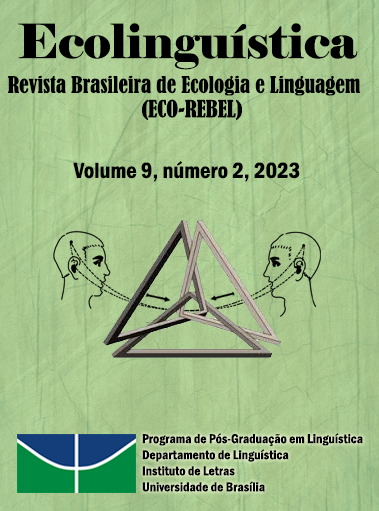A interação ficcional pela perspectiva da Análise do Discurso Ecossistêmica: um estudo de fábulas
Keywords:
Análise do Discurso Ecossistêmica. Interação ficcional. Fábula.Abstract
Este trabalho tem o objetivo de apresentar um estudo inicial sobre as interações ficcionais na perspectiva da Análise do Discurso Ecossistêmica (ADE). Para isso, são tecidas algumas considerações acerca da articulação entre ADE e literatura, mais especificamente a narrativa, bem como sobre o que se entende aqui por ficção, partindo-se da noção de mímesis. Os aspectos da interação ficcional são apresentados tendo-se como corpus uma fábula de Esopo e duas versões criadas por Monteiro Lobato: “A cigarra e a formiga”, “A formiga boa” e “A formiga má”. Na análise das fábulas, utiliza-se o método da focalização, no qual se opta for focalizar as interações que ocorrem na narrativa em sua imanência, desconsiderando aqui a produção e recepção das obras. O estudo das fábulas possibilitou a construção de um modelo teórico de análise de narrativas segundo a ADE. Espera-se, com isso, ampliar as possibilidades de estudo de narrativas utilizando-se como arcabouço teórico os pressupostos da ADE.
Downloads
Downloads
Published
How to Cite
Issue
Section
License

This work is licensed under a Creative Commons Attribution-NonCommercial-NoDerivatives 4.0 International License.
Authors who publish in this journal agree to the following terms:
Authors retain copyright and grant the journal the right of first publication. The work is simultaneously licensed under the Creative Commons Attribution License allowing the sharing of the work with acknowledgment of the authorship of the work and initial publication in this journal.
Authors are authorized to enter into additional contracts separately for non-exclusive distribution of the version of the work published in this journal (e.g., publishing in institutional repositories or as book chapters), with acknowledgment of authorship and initial publication in this journal.
Authors are allowed and encouraged to post and distribute their work online (e.g., in institutional repositories or on their personal page) at any point before or during the editorial process, as this can bring about productive revisions as well as increase impact.
Citation of published works (See The Effect of Free Access).



3.png)



